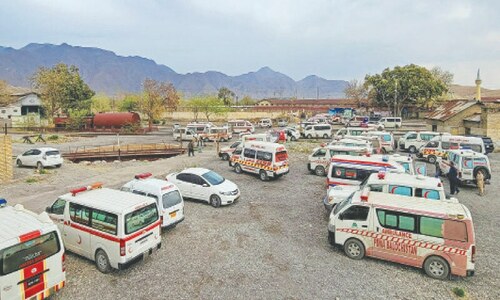ISLAMABAD: Smog is becoming a permanent feature of life in Pakistan, as a recent survey by Ipsos revealed that almost 79 per cent (around eight out of 10) people have been exposed to its toxic effects once over the past month.
The survey, conducted in the third week of November to gauge awareness and perceptions of this problem, deployed a ‘CATI’ interviews approach and had a sample size of over 1,000 participants, spread across four provinces and Islamabad.
“Over one-third of [respondents] found their daily [household] activities, work life and social events being affected by smog,” the survey said, adding that children’s education and health were the most affected. The toxic air quality also takes a toll on work, socialisation, and shopping.
Men (87pc) were more exposed to smog than women (71pc) and people living in urban areas (84pc) fared worse than those who resided in rural areas (76pc) during the previous month.
Punjab was the most affected province with 94pc of its population exposed to toxic air quality, followed by Khyber Pakhtunkhwa with 72pc.
In Lahore, everyone experienced smog, whereas in Multan 93pc people experienced it, followed by Rawalpindi and Islamabad where 88pc were exposed to smog in October.
Social life in Rawalpindi and Lahore almost came to a halt because of smog as over 80pc of respondents were said to be impacted by smog.
In Peshawar, one of the most polluted cities in Pakistan, the most affected were the daily household activities as 85pc respondents reported disruptions in their routine due to poor air quality.
Besides other spheres of life, the healthcare system continued to buckle under the weight of above-normal particulate matter.
“Seven in 10 report having health issues because of smog. Cough, flu, and breathing difficulties are the most common symptoms,” the survey reported.
Moreover, 68pc respondents reported cough, 66pc reported flu, and 37pc respondents had breathing difficulties due to toxic air quality.
Some 29pc of the respondents said they had burning sensations in their eyes due to smog while 4pc had experienced fever among their symptoms.
Primary cause
Most of the participants involved in the survey blamed vehicular emissions for smog, followed by industrial emissions, and waste burning. The brick kilns and stubble burning were at the bottom.
“For Pakistanis vehicle emissions (70pc), industrial smoke (63pc) and waste burning (37pc) are the top three reasons for smog followed by brick kilns (31pc) and crop remains’ burning (30pc), while one in 5 [19pc] believe it as wrath of Allah.” About 11pc respondents blamed construction activities as the primary cause of smog.
According to a government document, Lahore’s vehicular traffic “contributes 40-50pc of urban air pollution, particularly near schools during pick-and-drop hours”, whereas EPA’s monitoring in 2024 revealed that “PM10 levels on construction sites ranged between 349–375µg/m³”.
“Pakistanis see lack of public cooperation (44pc) and enforcement of rules (37pc) as major barriers in combating smog and air pollution, highlights the lack of fulfilment of responsibilities by citizens,” said the survey.
However, it noted that eight out of 10 Pakistanis agreed that they needed to play their part in combating smog, with 73pc saying the government should take the lead in the fight against smog.
Published in Dawn, November 30th, 2024













































